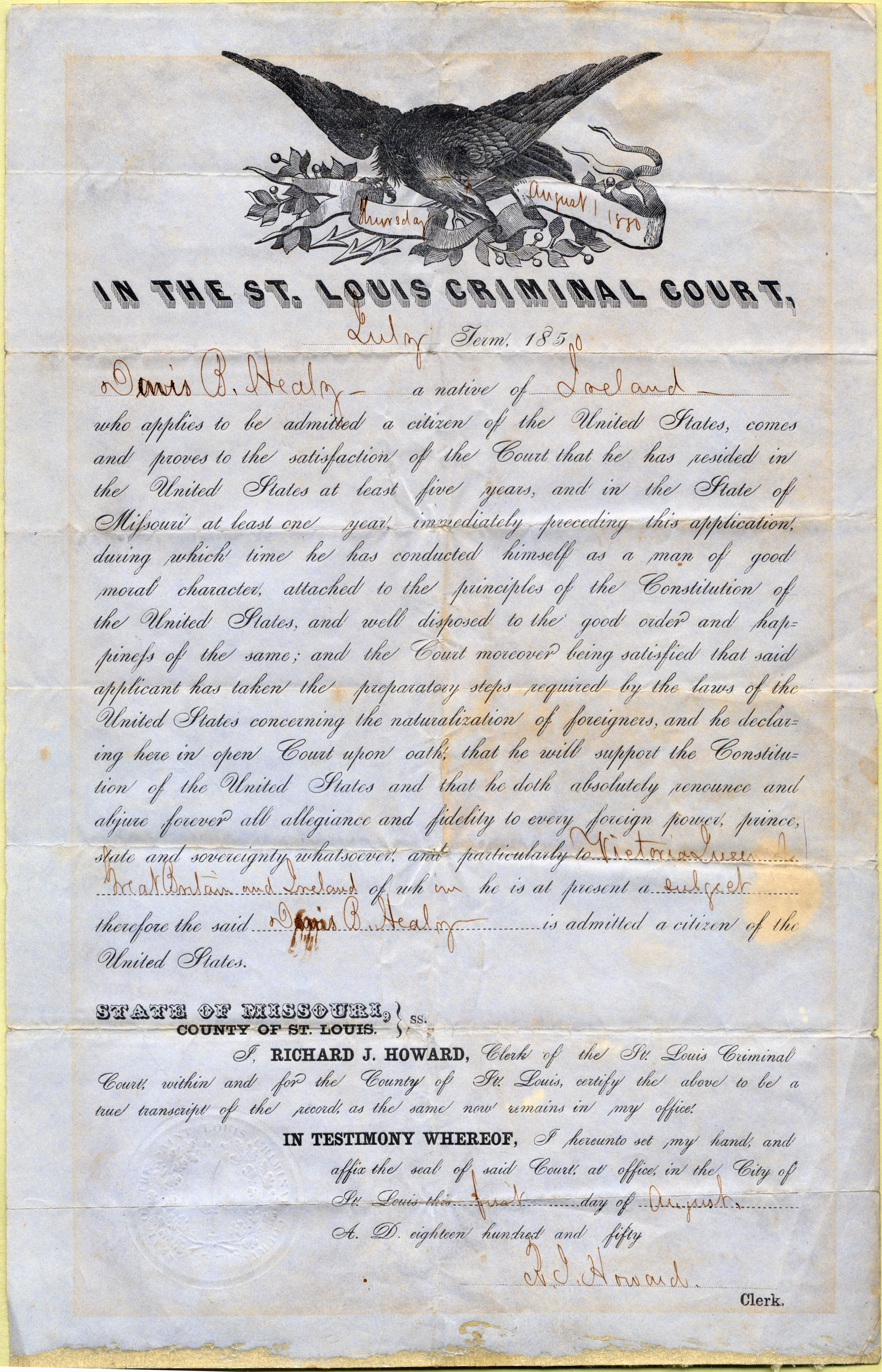
JEFF-1928
The Old Courthouse regularly hosts several naturalization ceremonies throughout the year. The City of St. Louis attracts people from all over the world; in a recent ceremony in the Old Courthouse, 21 people from 15 different countries became U.S. citizens. The beautiful Rotunda setting, decked in patriotic bunting, may be the primary reason for its popularity as a venue, but it seems very fitting that these ceremonies take place at the Old Courthouse because people have been coming to this building to become citizens for over 150 years.
In 1850, a man named Denis B. Healy walked into the Criminal Court in the Old Courthouse and proved to the court’s satisfaction that he had resided in the United States for five years and had been a Missouri resident for the last year. The clerk filled out this form, and Healy became an official citizen of the United States. While it may sound like a much easier process than what new citizens go through today, it was a very discriminatory process that excluded many from becoming citizens.
Congress passed the first Naturalization law in 1790 and limited citizenship opportunity to “free white persons, who have resided within the limits and under the jurisdiction of the United States for the term of two years. “ By the time Healy applied for citizenship, some changes had been made in the terms. A potential citizen could go to any court of record after two years residency in the U.S. and file a declaration of intent to become a citizen. Then after three more years the immigrant could seek naturalization papers to complete the process. The opportunity of citizenship was still restricted to free white persons, however. It wasn’t until the Naturalization Act of 1870, after the Civil War, that immigrants from Africa could be a part of the naturalization process. The Naturalization Act of 1870 and the Page Act of 1875 specifically excluded immigrants it considered “undesirable” – specifically those from Asia – due to prejudice against the Chinese in the western states. The Naturalization Act of 1906 made the federal government the final authority on naturalization policy and established the Bureau of Naturalization and Immigration.
In this particular document, the immigrant is forced to not only swear to uphold the Constitution of the United States, they must renounce loyalty not just to their former country, but the leader of it, personally. For Healy, that leader was Queen Victoria.
The text of the form reads:
Thursday, August 1, 1850
In the St. Louis Criminal Court,
July Term, 1850
Denis B. Healy a native of Ireland
who applied to be admitted a citizen of the United States, comes
and proves to the satisfaction of the Court that he has resided in
the United States at least five years, and in the State of
Missouri at least one year, immediately preceding this application,
during which time he has conducted himself as a man of good
moral character, attached to the principles of the Constitution of
the United States, and well disposed to the good order and hap-
pines of the same; and the Court moreover being satisfied that said
application has taken the preparatory steps required by the laws of the
United States concerning the naturalization of foreigners, and he has declar-
ing here in open Court upon Oath; that he will support the Constitu-
tion of the United States and that he doth absolutely renounce and
abjure forever all allegiance and fidelity to every foreign power, prince,
states and sovereignty whatsoever, and particularly to Victoria, Queen of
Great Britain and Ireland of whom he is at present a subject
therefore the said Denis B. Healy is admitted a citizen of the
United States.
State of Missouri
County of St. Louis
I, Richard J. Howard, Clerk of the St. Louis Criminal
Court within and for the County of St. Louis, certify the above to be a
true transcript of the records as the same now remains in my office.
In Testimony Whereof, I hereunto set my hand and
affix the seal of said Court at office in the City of
St. Louis this first day of August
A.D. eighteen hundred and fifty
R. J. Howard
Clerk
If you have the chance to attend a naturalization ceremony at the Old Courthouse, they are very moving ceremonies that are usually scheduled around Flag Day, the Fourth of July and Constitution Day. The ceremonies are open to the public.
